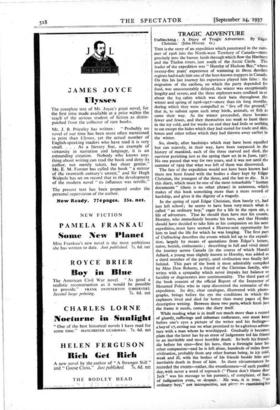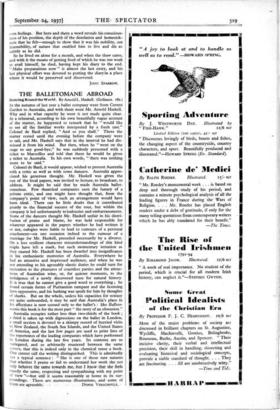TRAGIC ADVENTURE
Unflinching : A Diary of Tragic Adventure. By Edgar Christian. (John Murray. 6s.)
THIS is the story of an expedition which penetrated in the sum- mer of 1926 into the North-west Territory of Canada—more precisely into the barren lands through which flow the Hanbury and the Thelon rivers, just south of the Arctic Circle. The leader of the expedition was " Homby of Hudson Bay," whose twenty-five years.' experience of wintering in those_ desolate regions had made him one of the best-known trappers in Canada. On this his last journey his experience played him false : the migration of the caribou, on which the party depended for food, was unaccountably delayed, the winter was exceptionally lengthy and severe, and the three explorers were confined in or about the log cabin which was their babe throughout the winter and spring of 1926-1927—more than six long months, during which they were compelled to " live off the ground," that is, to subsist upon such stray birds, animals, or fish as came their way. As the winter proceeded, these became fewer and fewer, and they themselves too weak to hunt them in the icy cold, and for weeks on end they had little or nothing to eat except the hides which they had stored for trade and skin, bones and other refuse which they had thrown away earlier in the winter.
So, slowly, after hardships which may have been equalled but can scarcely, in their way, have been surpassed in the history of mankind, each of the three starved and died, the survivor perishing just as the spring thaw set in in June, 1927. No one passed that way for two years, and it was not until the summer of 1929 that what was left of them was discovered.
The fate of the expedition would not have been known had there not been found with the bodies a diary kept by Edgar Christian, the youngest of the three, and the last to die. _ It is this diary, which must be•one of the most remarkable " human documents " (there. is no other phrase) in existence, -which makes of this book something more than a mere record of hardship, and gives it the dignity of a tragedy.
In the spring of 1926 Edgar Christian, then barely 17, had just left school; he seems to have been very much what is called " an ordinary boy," eager for a life in the open air, a life of adventure. That he should then have met his cousin, Homby, who immediately became his hero, and that Hornby should have decided to take him as his companion on his next expedition, must have seemed a Heaven-sent opportunity for him to lead the life for which he was longing. The first part of Unflinching describes the events which led up to the expedi- tion, largely by means of quotations from Edgar's letters, naive, boyish, enthusiastic ; describing in full and vivid detail the journey across- Canada (in the course of which Harold Adlard, a young man slightly known to Hornby, was added as a third member of the party), until civilisation was finally left behind. This part of the book is most admirably compiled by Miss Dew Roberts, a friend of the Christian family, who writes with a sympathy which never impairs her balance or lucidity or degenerates into sentimentality. The third part of the book consists of the official Report of the Inspector of Mounted Police who in 1929 discovered the remnants of the expedition. Its dry, clear catalogue, illustrated with photo- graphs, brings before the eye the conditions in which the explorers lived and died far better than many pages of fine descriptive writing: Between these two parts, which form just the frame it needs, comes the diary itself.
While reading what is in itself not much more than a record of ghastly, sufferings and inhuman endurance, one must keep before one's eyes a picture of the writer and his feelings— a boy of 17, setting out on what promised to be a glorious adven- ture with a man whom he worshipped. Gradually it becomes plain that the latter has by an error of judgement led his friend to an inevitable and most horrible death: So- both his friends die before his eyes—first his hero, then a fortnight later his other companion—and he is left alone, hundreds of miles from civilisation, probably from any other human being, in icy cold, weak and ill, with the bodies of his friends beside him and inevitable death in front of him. In these circumstances he recorded the events—rather, the eventlessness—of each passing day, with never a word of reproach (" Please don't blame dear Jack " was his message to his parents), of complaint, of fear, of indignation even, or despair. He was, it is true, " an ordinary. boy," not introspective, not giv-r- .0" examining his cwn feelings. But here and there a word reveals his conscious- ness of his position, the depth of the desolation and homesick- ness that he felt—enough to show that it was his nobility, not insensibility, of nature that enabled him to live and die as calmly as he did.
So he lived on alone for a month, and when the thaw came, and with it the means of getting food of which he was too weak to avail himself, he died, having kept his diary to the end. " Make preparations now " is almost the last entry, and his last physical effort was devoted to putting the diary in a place where it would be preserved and discovered.
JOHN SPARROW.



















































 Previous page
Previous page